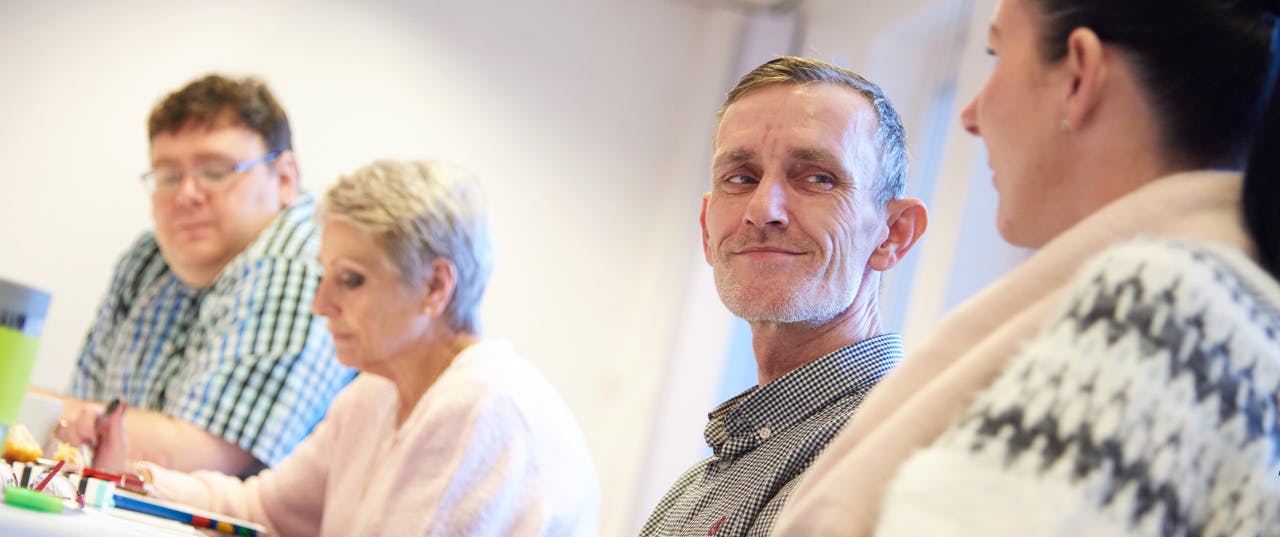Evaluation Approach
Evaluation and learning has been integral to the Fulfilling Lives programme. In 2013, we commissioned CFE Research and The University of Sheffield to carry out the national evaluation. The evaluation spanned 9 years and generated useful and insightful evidence about the programme and multiple disadvantage more broadly. Partnership areas also had their own local evaluations. View Fulfilling Lives reports in The Fund’s evidence library.
The national evaluation aimed to:
- Track and assess the achievements of the programme
- Calculate the value of benefits to the exchequer and wider society
- Identify what interventions and approaches work well, for which people and in what circumstances
- Assess the extent that our principles (e.g. coproduction, partnership working) are incorporated into project design and delivery and the difference they make
- Explore how projects are delivered, understand problems faced and help identify solutions and lessons learned.
As a long-term test and learn programme, Fulfilling Lives evolved and changed over time and the evaluation adapted in response. Although the aims were maintained, the approach changed in recognition that we were operating in complexity. We moved away from a traditional impact evaluation and explored our system change priorities using qualitative techniques. The evaluation also benefited from a Common Data Framework to understand beneficiary characteristics and track service use, risk, need and other outcomes over time.
CFE Research reflected on some of the learning from delivering such a large and complex evaluation in Evaluating Fulfilling Lives.
Evaluation Findings
The Fulfilling Lives Programme Summative Evaluation report draws on evidence throughout the programme and is a useful resources for anyone who wants to learn more about the programme or multiple disadvantage. The report reflects on the difference the programme made to people and the extent the system has changed and where change is still needed. Some of our key findings are:
Changes for individuals
- Over 4,000 people were directly supported by the programme
- Over 1,200 people left the programme for a positive reason (41% who left)
- Partnerships demonstrated the benefits of a holistic and strengths-based approach. Effective support was trauma-informed, persistent and ongoing.
- Low caseloads for frontline staff gave the time needed to work in a personalised way. Navigators supported people through what can be a complex and confusing system.
- Fulfilling Lives has shown that it is possible to engage and support those with the most complex and entrenched needs. There were significant:
- reductions in time spent homeless and rough sleeping
- improvements in people’s self-reliance
- reductions in levels of need and risk
- Fewer negative interactions with public services, such as arrests and visits to A&E
Changes to systems
- Attitudes towards multiple disadvantage have shifted, with a greater recognition of the role and impact of trauma.
- There is a better understanding of the need for involving people with lived experience of multiple disadvantage in the design and delivery of services.
- New structures exist to enable greater collaboration and coordination across agencies and sectors, and Fulfilling Lives leaves behind a local workforce better equipped to support this group.
- Multiple disadvantage is also now firmly on the national political agenda: the Changing Futures programme has adopted much of the learning from Fulfilling Lives.
- However, changing systems takes time. Even after eight years, challenges remain.
- The programme made less progress in addressing siloed and short-term commissioning.
- While the role of navigators on the programme has been effective in supporting better outcomes for individuals, there is no reduction in the need for this support as the service user journey remains complex and difficult.
- Fulfilling Lives staff have advocated on behalf of beneficiaries and supported them into services, but there is only so much they can do if appropriate and accessible services do not exist.
- More needs to be done to make mental health services in particular more accessible to people experiencing co-occurring substance
Evidence about multiple disadvantage
In 2019, four briefings on multiple disadvantage using the Common Data Framework were published. These provided a unique and valuable addition to the evidence base. Read each briefing here –
Systems change priorities
During the last several years of the evaluation, we focused on generating evidence to support the systems change priorities set by the Systems Change Action Network (SCAN). Each of the 5 main priorities have been explored and reports published:
1. Developing and expanding the role of co-production in creating effective systems change
Coproduction: Principles into practice
2. Embedding a culture of systems thinking and ‘what works’ in creating systems change
Creating systems change: Evaluating the contribution of the Fulfilling Lives programme
The role of lived experience in creating systems change
3. System-wide workforce development, including the importance of trauma-informed and strengths based approaches
Summary: Workforce development and multiple disadvantage
Briefing 1 - Involving people with lived experience in the workforce
Briefing 2 - What Makes an Effective Multiple Disadvantage Navigator?
Briefing 3 - Upskilling the Wider Workforce
Briefing 4 - Working With Commissioners and Policy-Makers
4. Improving access to services – particularly mental health services
Full report - Improving access to mental health support
Summary - Improving access to mental health support
5. Improving service transitions – including hospital discharge and prison release
Improving service transitions for people experiencing multiple disadvantage: Prison release
'More than a roof' - addressing homelessness with people experiencing multiple disadvantage
COVID-19 Response
Challenges and opportunities - Evidence from Fulfilling Lives partnerships on the response to the COVID-19 pandemic - This report draws together the experiences and perspectives of staff, volunteers and Fulfilling Lives programme on the changes they have helped implement or observed in response to the COVID-19 pandemic
There are many more national evaluation
and partnership-level evaluation
reports available in the Fund’s evidence library.
Our responses to Government

